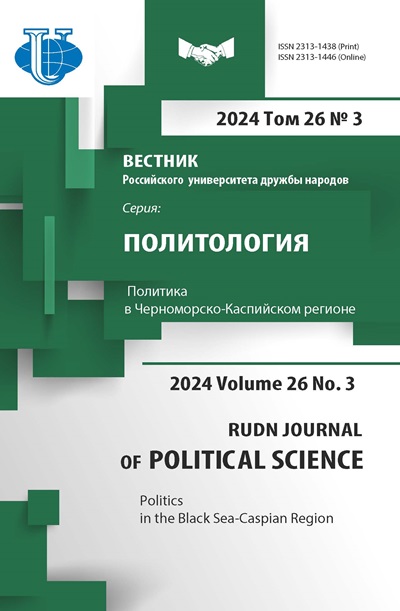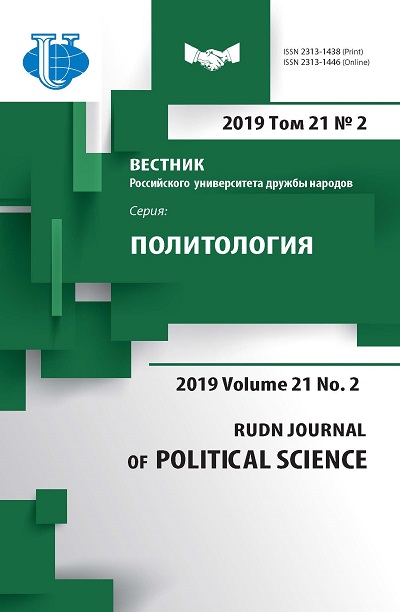MODELS OF POLITICAL BEHAVIOR OF YOUTH MIDDLE CLASS OF MODERN AGGLOMERATIONS: ON THE EXAMPLE OF THE MAIN REGIONS OF THE NORTH]WEST AND SOUTH SIBERIA
- Authors: Lagutin O.V1, Negrov E.O1
-
Affiliations:
- Saint-Petersburg State University
- Issue: Vol 21, No 2 (2019)
- Pages: 157-174
- Section: POLITICAL PROCESS IN CONTEMPORARY RUSSIA: TENDENCIES AND PROSPECTS
- URL: https://journals.rudn.ru/political-science/article/view/21835
- DOI: https://doi.org/10.22363/2313-1438-2019-21-2-157-174
Cite item
Full Text
Abstract
The article deals with the peculiarities of the models of political behavior of young people, which can be attributed to the middle class. The relevance of the study is in the combination of a well-founded review of the main directions of research of the role of youth participation in the social and political process and the involvement of a specific empirical study conducted in the autumn of 2018, which allows to highlight various aspects of the situation. The empirical part of the study is based on the study “Ideas of Youth about Possibilities of Youth Leaders and Youth Organizations in Russia”, which was conducted in late September and early October 2018 in four regions of the Russian Federation: Altai, Leningrad and Novosibirsk Regions and St. Petersburg. The method of research was a personal standardized interview, the sample size was 1000 respondents (250 in each of the regions), who were representatives of young people aged 14 to 30 that permanently reside in the territory of the studied subjects of the federation. Based on factor and cluster analyzes, the research presents the main models of the political behavior of young people belonging to the middle class. The article is of interest to researchers of interconnections between the real political process and youth as a significant group of the population.
Keywords
About the authors
Oleg V Lagutin
Saint-Petersburg State University
Author for correspondence.
Email: o.lagutin@spbu.ru
PhD in Political Science, Associate Professor of the Department of Political Institutions and Applied Political Studies, Saint-Petersburg State University
Saint-Petersburg, Russian FederationEugene O Negrov
Saint-Petersburg State University
Email: st007528@mail.spbu.ru
PhD in Political Science, Associate Professor of the Department of Political Institutions and Applied Political Studies, Saint-Petersburg State University
Saint-Petersburg, Russian FederationReferences
- Gorshkov M.K., Sheregi F.E. The Youth of Russia: Sociological Portrait. Moscow: TsSPiM; 2010. 592 p. (In Russ.).
- Gukova I.N. Perspective Forms of the Development of Socio-Political Activity of Young People in the Russian Federation. Theory and Practice of Social Development. 2015; 3 (5): 156—159 (In Russ.).
- Doroshenko S.V., Solomatin Ya.I. Megapolis as an Environment for the Formation of Political Orientations of Young People. Bulletin of the PNRPU. Socio-economic Sciences. 2018; 1: 157— 170 (In Russ.).
- Erofeeva M.A., Belous E.Yu. Development of Youth Initiatives as a Direction of the State Educational Youth Policy. Pedagogical Education and Science. 2017; 3: 123—127 (In Russ.).
- Zhilavskaya I.V. Youth Media Education. Moscow: RIC MGGU named after M.A. Sholokhov; 2013. 243 p. (In Russ.).
- Zubok Yu.A., Rostovskaya T.K., Smakotina N.L. Youth and Youth Policy in Modern Russian Society. Moscow: Perspectiva; 2016. 166 p. (In Russ.).
- Ilinsky I.M. Youth and Youth Policy: Series Philosophy. History. Theory. Moscow: Golos; 2001. 694 p. (In Russ.).
- Ilinsky I.M. On the Youth Policy of Russian Political Centrism. Moscow: Socium; 1999. 102 p. (In Russ.).
- Karataban I.A. The Social Activity of Youth in the Context of Contemporary Modernization Processes. Vestnik MGTU. 2018; 2: 128—134 (In Russ.).
- Koryakovtseva O.A. Conceptual Foundations of the Development of Social and Political Activity of Young People in Post-Soviet Russia. Scientific Bulletin of Belgorod State University. Series: History. Political Science. 2016; Vol. 38; 8 (229): 156—162 (In Russ.).
- Koryakovtseva O.A., Gunta K. Modern Youth: Civic Engagement and Political Participation. Supplementary Professional Education in the Context of Modernization. Materials of the Seventh All-Russian Scientific and Practical Internet Conference (with international participation). Ed. by M.V. Novikova. Yaroslavl: State University named after K.D. Ushinsky; 2015: 171— 176 (In Russ.).
- Levikova S.I. Youth Subculture. Moscow: FAIR-PRESS; 2004. 604 p. (In Russ.).
- Malik Ye.N. Mass Media as an Institute for the Political Socialization of Youth in Modern Russia. Orel: Publishing house ORAGS; 2009. 168 p. (In Russ.).
- Malkevich A.А. Information Policy of Russia and Problems of Political Socialization of Youth. Omsk University Bulletin. Series “Historical Sciences”. 2015; 3 (7): 97—102 (In Russ.).
- Morozov M.М. Electoral Preferences of Young People. Formation of General Cultural and Professional Competencies of a Financier. Moscow; 2018: 99—104 (In Russ.).
- Omelchenko E.L. Youth Cultures and Subcultures. Moscow: Publishing House of the Institute of Sociology, Russian Academy of Sciences; 2000. 264 p. (In Russ.).
- Perina E.I. Sociological Analysis of the Features of the Political Culture of the Population of a Metropolis in Contemporary Conditions: Abstract of the PhD thesis in social sciences. Ekaterinburg; 2009. 24 p. (In Russ.).
- Plotnikova T.V. Political Behavior in Russia (socio-philosophical analysis): Abstract of the PhD thesis in philosophy. Rostov-on-Don; 2004. 52 p. (In Russ.).
- Polivaeva N.P. Political Consciousness in the Conditions of Transformation of Russian Society: Abstract of the PhD thesis in political science. Moscow; 2009. 56 p. (In Russ.).
- Popova N. Youth Leaders in the Organization of Work with Young People at Industrial Enterprises. CITISE. 2018; 1: 18 (In Russ.).
- Pushkareva G.V. Political Behavior: Theory, Methodology and Practical Possibilities of the Cognitive Approach: Abstract of the PhD thesis in philosophy. Moscow; 2004. 44 p. (In Russ.).
- Sergeev V.K. Youth Culture and Media. Moscow: RIC ISPI RAS; 2002. 188 p. (In Russ.).
- Starodubtseva M.A. Youth Public Organizations and Their Role in Counteracting Sectarianism in the Internet Environment. Achievements of High School Science 2018. 2018: 229—232 (In Russ.).
- Startseva S.G. Dynamics of Political Preferences of Regional Youth in the Conditions of Transformation of the Modern Russian Society (on the example of the Vologda region): Abstract of the PhD thesis in political science. SPb.; 2013. 26 p. (In Russ.).
- Surkov V.Yu. Putin's Long State. On What Happens Here in General. Nezavisimaya Gazeta. 2019; 028 (7504); 11.02.19: 2—4 (In Russ.).
- Trofimova I.N. “Megapolis” and “Remote” as a Model of Value Orientations and Political Attitudes of Russians. Sociological Science and Social Practice. 2014; 3 (7): 60—78 (In Russ.).
- Fedorov P.M. Petitions and Appeals as a Form of Political Activity in Modern Russian Society. Vestnik PAGS. 2014; 4 (43): 83—93 (In Russ.).
- Shabanov L.V. Social and Psychological Characteristics of Youth Subcultures: Forced Marginality? Tomsk: TSU Publishing House; 2005. 399 p. (In Russ.).
- Karagianni D., Montgomery A.J. Developing Leadership Skills among Adolescents and Young Adults: A Review of Leadership Programmes. International Journal of Adolescence and Youth. 2018; Vol. 23: 86—98.
- Larina S.E. The Relationship Leadership Skills and Individual Personality Characteristics of Young People in Modern Russia. The World of Science. Sociology, Philology, Cultural Studies. 2016; 2: 11.
- Murphy M.T. Youth in Front: Supporting Youth-led Social Action. Social Education. 2018; Vol. 82; 5: 255—259.
- Zeldin S., Gauley J., Krauss S.E. Youth-Adult Partnership and Youth Civic Development: Crossnational Analyses for Scholars and Field Professionals. Youth & Society. 2017; Vol. 49; 7: 851—878.
















